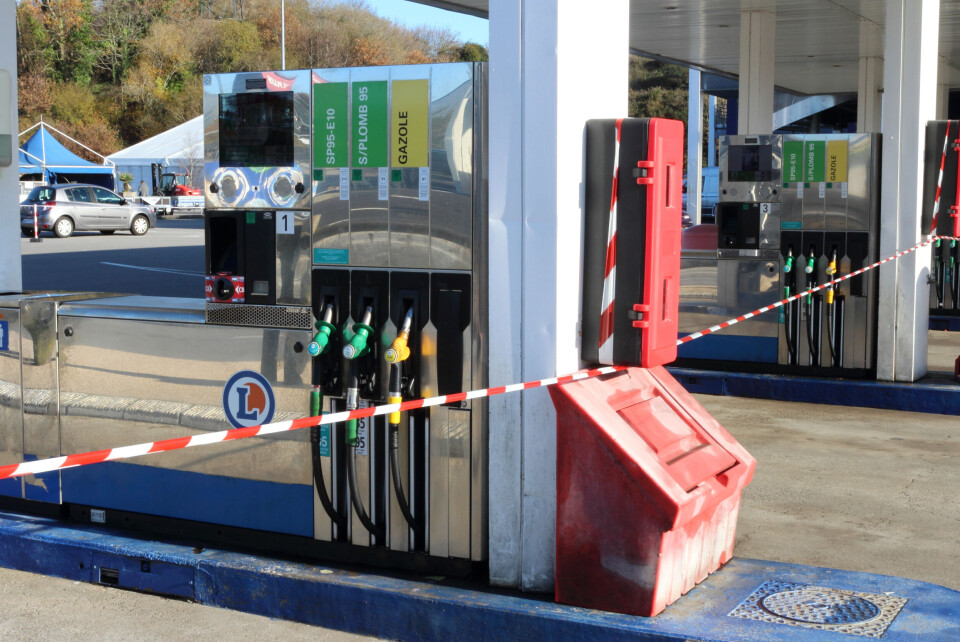-
White storks make strong return in France via nest ‘platforms’ and clipped wings
The Ligue pour la Protection des Oiseaux shares the conservation challenges in saving these birds from extinction
-
Hosting scheme in south-west France lets newcomers sample lifestyle
Households in nine Dordogne communes volunteer under Mes Nouveaux Voisins scheme
-
French boulangeries demand right for staff to work on May 1 so they can open
Artisan bakery owners can work but employees cannot, while certain industrial bakeries are allowed to remain open with workers
Thursday’s French pension strike: alert over fuel panic-buying
People are being urged to delay trips and work from home as a ‘nightmare’ transport day approaches; selected power cuts and school closures are among other likely impacts

France could run out of petrol if too many drivers panic buy ahead of the planned pension reform strikes this Thursday (January 19), the spokesperson for the fuel industry has warned.
Petroleum industry spokesman Olivier Gantois told FranceInfo: “If you all go and fill up your tanks tomorrow (January 18), we won’t survive.”
Mr Gantois, who is also president of the Ufip Energie Mobilité union, said fuel stock levels are generally ‘normal’ at the moment, with supplies having recovered after a low in September-October 2022. However, he said: “‘Just in case’ fill-ups will drain petrol stations extremely fast.”
France 3 has compiled an interactive, updated map of what fuel (petrol of diesel) is available where, geographically, based on government data. At present areas already affected include Pas-de-Calais, where 13% of fuel stations are lacking petrol or diesel and Yvelines (18%). In these two departments 5% of stations have no fuel at all.
The warning comes ahead of planned strikes among refinery staff, who are set to join a wider strike against the government’s proposed pension reform plans on January 19.
Refinery staff are also planning to strike for two days next week and three days the week after that, said Mr Gantois. It was not yet clear how many refineries, and how many staff, would take part, nor for how long the strikes would continue.
The CGT union has declared it is hoping for “very strong mobilisation” in Thursday’s general strike movement, similar to strikes in 1995, or 2010. Unionists and other supporters of the movement are hoping for up to a million protestors in the streets.
Read more: French pension strike: union says it aims to ground all transport
Minister: ‘Delay trips and work from home’
Transport Minister Clément Beaune is recommending homeworking where possible on Thursday, when roads and public transport are likely to be badly affected on what will generally be a “very difficult day”.
He told France 2: “It will be chaotic on Thursday, and a day of major transport disruption. So I’m saying to those who can: do everything to delay travel and work from home. Above all, I hope that this situation will not last long.”
Mr Beaune said he was asking transport company managers to "work with the trade unions” so as to “give support to the pension reforms”.
He defended the government’s planned reforms, saying that they will "save our pension system". However he said employers should seek to address “the problem of people becoming worn-out at work, the physical strain of certain jobs and career development" so as to "reduce the tension in the coming days”.
Trains will also be affected, as railway workers’ unions are also involved, with one union Unsa-ferroviaire demanding that there must not be “one day, one month or one year” or extra work required before retirement.
A union for the Paris transport network RATP said they were aiming at ‘zero transport’ on the main day.
Unions are expected to decide at the end of the day on Thursday what follow-up may be required.
Electricity cut-off threats
With strong support for strikes also in the gas and electricity sectors, power cuts are also likely.
Union leaders at the CGT have threatened to visit MPs and councillors in their local offices so as to explain their point of view, and then to target them especially for electricity cuts if they continue to support the reforms.
However they would seek to avoid any “collateral damage” because they “don’t want to get the public’s backs up”, one union spokesman said.
In response, Renaissance MP president, Aurore Bergé, said: “Intimidation and threats have no place in a democracy.
Health service impacts
Many health workers are expected to continue their vital work despite the fact health unions such as Unsa-santé are also backing the movement. However, you are likely to see some of them wearing armbands declaring their solidarity with the strikes.
Even so, there are warnings of knock-on effects from other disruption, notably in transport, if strikes stop workers getting into work.
What about schools?
It is unclear how many teachers will take part on Thursday, with some reports predicting that lycées professionnels will be among the sectors most affected. In some cases whole lycées are expected to shut.
Unions have stated that teachers are already exhausted at the end of their careers due to problems such as having to teach classes that are too large.
However, the impact is likely to vary from area to area. In the Rhône department, for example, unions have announced that three-quarters of primary school teachers plan to join the strikes.
In theory, in this case, a ‘minimum service’ has to be organised if at least 25% of staff are on strike. Local authorities are expected to supply council staff to supervise the children but it remains to be seen if this will be effective as many council workers also plan to strike.
Related articles
Fuel aid, pension strike action, tax credits: The week ahead in France
























